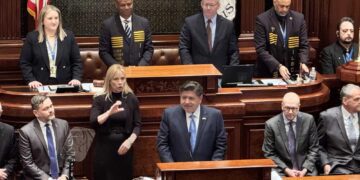By John F. Di Leo -
On Tuesday, June 7, voters went to the polls in California, and produced a surprising result. San Francisco District Attorney Chesa Boudin was overthrown in a rare, successful recall election.
Ask the typical American voter what inspires his dislike for politicians, and he is likely to say he’s turned off by their dishonesty, their platitudes, their failure to keep campaign promises (they’re not necessarily right about this, but these are the answers one gets).
That wasn’t the case here.
Chesa Boudin, son of the Weather Underground, ran for District Attorney on a clear political platform: throwing open the prison gates, attacking police instead of criminals, and eliminating bail so that criminals could be set free upon capture, rather than holding them for trial. It was a clear platform of support for the criminal element, and just as clearly, a statement of opposition to the valid concerns of the millions of law-abiding citizens who fear the growing crime problem in America’s cities.
Chesa Boudin was elected, and what was the result?
He eliminated cash bail; his office didn’t prosecute people. His office let criminals go upon being captured, declined to prosecute, or happily pled down to lesser charges. His office essentially threw open the prison gates, making San Francisco a welcome center for the criminal element, and a danger zone for residents, businesses, and tourists alike.
For all intents and purposes… exactly as he promised.
One of the great showbiz legends is the story of Sid Caesar’s first television series, 1949’s Admiral Broadway Review, which was sponsored by Admiral, an appliance manufacturer that made televisions. Sid Caesar’s show was so successful, Admiral couldn’t keep up with demand, so they canceled the program.
Caesar spent the rest of his life proudly retelling the story, taking credit for having been the first show in history to be canceled because it was too successful.
While we might be hard-pressed to find a San Francisco voter who will admit to the fact, the story of Chesa Boudin is much the same: he was recalled because he kept his promises; he did exactly what he said he would do, and the public found they couldn’t really handle the result after all.
Chesa Boudin didn’t violate his campaign promises or fail in his goals, he succeeded with flying colors. His entire tenure as district attorney is one of criminal coddling and civilian endangerment, exactly as promised.
There is a lesson here, one with national implications, because Chesa Boudin is not a stand-alone case.
From coast to coast, the United States of America is filled with big cities that have elected state's attorneys and district attorneys on the exact same platform as Chesa Boudin, all of whom have kept their promises just as well, predictably producing the exact same miserable results.
From Los Angeles to New York, from Chicago to Portland, our cities have become lawless danger zones – flooded with Central and South American gangs due to sanctuary policies, infested with criminals who are caught and released, caught and released, caught and released, usually without punishment, often without even prosecution.
And all by design.
The Right regularly reminds people that these DAs were elected with massive funding from George Soros and his affiliated organizations. It sounds like a conspiracy theory, but it is undeniable and easily demonstrable.
But there is an even bigger issue at hand: it’s not just about these city and county prosecutors’ offices alone.
The policies of criminal coddling and prison emptying have become mainstream positions across the Democratic Party. This is no longer an outlier position, so strange that George Soros has to meddle in primaries in order to spread the infection across the country. This pro-hoodlum program would infest the party even if George Soros were gone from the picture.
Look at the Biden-Harris campaign’s position statement from 2020. Review the Clinton-Kaine website from 2016. Look at the DNC‘s national platform.
There once was a time, long ago, when Democrat candidates looked conservative on issues like this and were only revealed to be leftist when you studied their tax-and-spend agendas and their wild fondness for the creation of new bureaucracies.
No more.
The policies of Boudin and Foxx, Gascon and Krasner, can now be found in bills introduced by Democrats across the country, in both federal and state legislatures, even in city councils and county boards.
These policies are at the very core of the so-called criminal justice reform initiative that the Democratic Party is running on, hard, as they struggle to retain some semblance of power in the 2022 midterms.
They have now had their first test, in that most liberal of cities. If voters in the liberal stronghold of San Francisco can see the error of their ways, then what happened this week in San Francisco is possible anywhere.
All the Republican party has to do is remind the voters that the dangerous programs destroying their communities are not limited to a few district attorneys, but rather, have become the very raison d’être of the Democrat party.
In these midterms, Republicans just need to get this one message out: that a vote for Democrats is a vote for crime.
On paper, it sounds like an exaggeration. But the simple fact is, for people living in fear for their families, their property, their jobs, and their neighborhoods, if they just open their eyes, can no longer deny the truth of it.
It might be too much to hope, but Chesa Boudin’s recall just might be the crack in the dam that finally wrests the metropolises of America from the corrupt control of Democrat party machines.
copyright 2022 John F. Di Leo
John F. Di Leo is a Chicagoland-based trade compliance trainer and transportation manager, writer and actor. A one-time county chairman of the Milwaukee County Republican Party, he has been writing regularly for Illinois Review since 2009.
A collection of John’s Illinois Review articles about vote fraud, The Tales of Little Pavel, and his 2021 political satires about current events, Evening Soup with Basement Joe, Volumes One and Two, are available, in either paperback or eBook, only on Amazon.
Don’t miss an article! Use the free tool in the margin to sign up for Illinois Review’s free email notification service, so that you always know when we publish new content!








